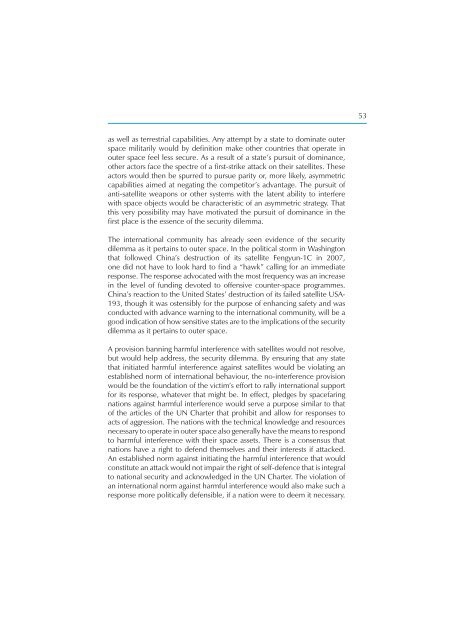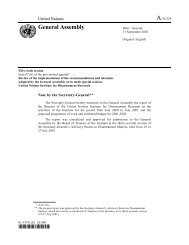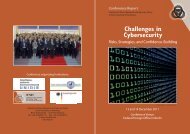Security in Space The Next Generation - UNIDIR
Security in Space The Next Generation - UNIDIR
Security in Space The Next Generation - UNIDIR
You also want an ePaper? Increase the reach of your titles
YUMPU automatically turns print PDFs into web optimized ePapers that Google loves.
as well as terrestrial capabilities. Any attempt by a state to dom<strong>in</strong>ate outer<br />
space militarily would by defi nition make other countries that operate <strong>in</strong><br />
outer space feel less secure. As a result of a state’s pursuit of dom<strong>in</strong>ance,<br />
other actors face the spectre of a fi rst-strike attack on their satellites. <strong>The</strong>se<br />
actors would then be spurred to pursue parity or, more likely, asymmetric<br />
capabilities aimed at negat<strong>in</strong>g the competitor’s advantage. <strong>The</strong> pursuit of<br />
anti-satellite weapons or other systems with the latent ability to <strong>in</strong>terfere<br />
with space objects would be characteristic of an asymmetric strategy. That<br />
this very possibility may have motivated the pursuit of dom<strong>in</strong>ance <strong>in</strong> the<br />
fi rst place is the essence of the security dilemma.<br />
<strong>The</strong> <strong>in</strong>ternational community has already seen evidence of the security<br />
dilemma as it perta<strong>in</strong>s to outer space. In the political storm <strong>in</strong> Wash<strong>in</strong>gton<br />
that followed Ch<strong>in</strong>a’s destruction of its satellite Fengyun-1C <strong>in</strong> 2007,<br />
one did not have to look hard to fi nd a “hawk” call<strong>in</strong>g for an immediate<br />
response. <strong>The</strong> response advocated with the most frequency was an <strong>in</strong>crease<br />
<strong>in</strong> the level of fund<strong>in</strong>g devoted to offensive counter-space programmes.<br />
Ch<strong>in</strong>a’s reaction to the United States’ destruction of its failed satellite USA-<br />
193, though it was ostensibly for the purpose of enhanc<strong>in</strong>g safety and was<br />
conducted with advance warn<strong>in</strong>g to the <strong>in</strong>ternational community, will be a<br />
good <strong>in</strong>dication of how sensitive states are to the implications of the security<br />
dilemma as it perta<strong>in</strong>s to outer space.<br />
A provision bann<strong>in</strong>g harmful <strong>in</strong>terference with satellites would not resolve,<br />
but would help address, the security dilemma. By ensur<strong>in</strong>g that any state<br />
that <strong>in</strong>itiated harmful <strong>in</strong>terference aga<strong>in</strong>st satellites would be violat<strong>in</strong>g an<br />
established norm of <strong>in</strong>ternational behaviour, the no-<strong>in</strong>terference provision<br />
would be the foundation of the victim’s effort to rally <strong>in</strong>ternational support<br />
for its response, whatever that might be. In effect, pledges by spacefar<strong>in</strong>g<br />
nations aga<strong>in</strong>st harmful <strong>in</strong>terference would serve a purpose similar to that<br />
of the articles of the UN Charter that prohibit and allow for responses to<br />
acts of aggression. <strong>The</strong> nations with the technical knowledge and resources<br />
necessary to operate <strong>in</strong> outer space also generally have the means to respond<br />
to harmful <strong>in</strong>terference with their space assets. <strong>The</strong>re is a consensus that<br />
nations have a right to defend themselves and their <strong>in</strong>terests if attacked.<br />
An established norm aga<strong>in</strong>st <strong>in</strong>itiat<strong>in</strong>g the harmful <strong>in</strong>terference that would<br />
constitute an attack would not impair the right of self-defence that is <strong>in</strong>tegral<br />
to national security and acknowledged <strong>in</strong> the UN Charter. <strong>The</strong> violation of<br />
an <strong>in</strong>ternational norm aga<strong>in</strong>st harmful <strong>in</strong>terference would also make such a<br />
response more politically defensible, if a nation were to deem it necessary.<br />
53








